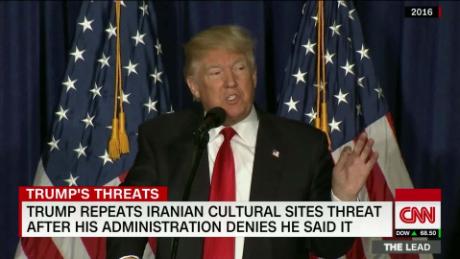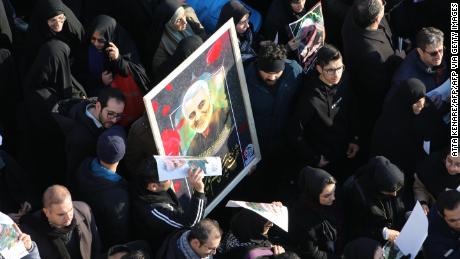China may not want war, however Trump's strike against Iran could present an opportunity to Beijing
Tue January 7, 2020
Friends...

Friends...

Hong Kong (CNN)Located thousands of feet up in the Central Asian mountains, Bishkek is not usually considered a place where international policy is made.
Last June, however, world leaders flocked to the capital of Kyrgyzstan for a meeting of the Shanghai Cooperation Organization, a key regional security and political alliance. Attendees included Russian President Vladimir Putin and Chinese leader Xi Jinping, as well as Iranian President Hassan Rouhani, with whom they posed alongside in photos from the event.
It was a pertinent reminder of Tehran's strong ties with two of the world's foremost powers, further underlined when the three countries held joint naval exercises near the strategically vital Strait of Hormuz in the Indian Ocean last month.

Russian President Vladimir Putin, Chinese President Xi Jinping and Iran's President Hassan Rouhani walk attend a meeting of the Shanghai Cooperation Organisation (SCO) Council of Heads of State in Bishkek on June 14, 2019.
In the wake of the US strike that killed Qasem Soleimani in Baghdad last week, Iran's leaders will likely be looking to those alliances to counterbalance American aggression, even as Tehran considers possible retaliation for the death of one of its most popular military figures.
China in particular could play a key role in containing the fallout and preventing another Middle Eastern conflict. In a call with his Iranian counterpart Saturday, Chinese Foreign Minister Wang Yi condemned the "military adventurist act by the US" which "goes against basic norms governing international relations and will aggravate tensions and turbulence in the region."
A statement added that Tehran hoped China could "play an important role in preventing escalation of regional tensions."
Such sentiments are also likely shared well beyond Iran's borders, including among other Middle Eastern powers which are no fans of Tehran. The killing of Soleimani could present Beijing with a major opportunity, not only to prevent another disastrous war, but to increase its influence in the region, supplanting an increasingly unpredictable Washington.

Warships sail in the Gulf of Oman during the second day of joint Iran, Russia and China naval war games in December 2019.
Softly, softly
For decades, Chinese foreign policy has been to adopt a light touch (at least rhetorically, if not always in practice).
Beijing's proposition to other countries is simple: unlike Washington, with its carping on about democracy and human rights, or insistence on IMF-style austerity, China wants "win-win solutions" that benefit both parties. Its focus on development and trade above all else has made it an attractive partner to countries -- both autocratic and not -- throughout the world.
The late Chinese leader Deng Xiaoping characterized this approach as "keeping a low profile and biding your time." But it could never last indefinitely, and increased involvement in every corner of the globe means Beijing's time may just have come.
Recent years have seen a shift towards a more interventionist, US-style foreign policy. This has included increasing arms sales -- though still nowhere near the level of the US -- and an expanded military presence abroad. China now has bases in the Horn of Africa, Central Asia and throughout the South China Sea, and has reportedly been considering a base in Pakistan on the Indian Ocean.
At the same time, Beijing has also increasingly replaced Washington as the leading financial donor for the developing world, in addition to striking major trade deals throughout Asia, the Middle East, and Africa as part of President Xi's signature Belt and Road megaproject.
While many of these developments have occurred in what could be considered Beijing's traditional sphere of influence, the Middle East is playing an "increasingly important role" as China surges toward becoming the next superpower, according to analysts Lindsey Ford and Max Hill.
"Although China's expanding presence in the Middle East is motivated by economic calculations, it nonetheless offers strategic opportunities for Beijing," they wrote for the Asia Society Policy Institute last August.
"China's emphasis on noninterference, state-led economic development, and regional stability resonates with many autocratic leaders in the Middle East, allowing China to promote its 'alternative' model of great power leadership."
Attractive alternative
A region where politics is massively shaped by the rivalry between both local and international powers, the Middle East is not an easy place to maintain a neutral policy or stay on the sidelines.
So far -- in no small part thanks to its humungous checkbook -- China has managed to thread the needle of maintaining ties with traditional allies such as Iran and Syria, while also improving relations with their rivals in Saudi Arabia, Israel and the United Arab Emirates. Beijing has also resisted strong pressure from Washington to ditch both Tehran and Damascus, using its role as a United Nations Security Council member to rein in some international action against them.
Yet just as the Kashmir issue has forced China to choose longtime ally Pakistan over its economic target India, sooner or later a crisis in the Middle East was likely to upset the delicate diplomatic balance Beijing was treading.
Tehran's enemies may frown at Beijing's refusal to ditch its old ally to make new ones, but this policy will appear far more attractive in the wake of Soleimani's death. And the distinct chance we could now be headed for another Middle Eastern conflict -- or at the very least a period of saber-rattling and disruption to global trade -- could prop up Beijing's ability to play all sides, perhaps indefinitely.
Writing for the Atlantic Council, a NATO-aligned think tank, analyst Jonathan Fulton argued this week that Beijing's interests "lie in a stable Middle East, and it has long been assumed that this would eventually require some kind of Chinese security role."
"China is not a revisionist state. It does not want to reshape the Middle East and take over the responsibility of securing it. It wants a predictable, stable region -- as much as that is possible -- in which it can trade and invest," Fulton added. "In killing Soleimani, (President Donald Trump) has made that more challenging. In the short term that will increase the cost of doing business and most likely put a lot of people at risk. In the long term, however, it may increase China's power and influence in the Middle East as it assumes a larger responsibility for securing its regional interests."
Such a role will likely be welcomed by many players in the region. Indeed, it's difficult to think of a more pertinent example of the contrast between Chinese and US policy than Trump threatening -- just as Beijing was calling for calm -- to target Iranian cultural sites, in what could well be a war crime if it was carried out.
Since the end of the Cold War, the US has been the paramount power not only in the Middle East, but throughout the globe. As China increasingly challenges American hegemony, the Middle East will likely emerge as a key arena for this rivalry.
By killing Soleimani and plunging the region into fresh chaos, Trump may have made it easier for Beijing to supplant Washington in years to come.
















No comments:
Post a Comment
Comments always welcome!